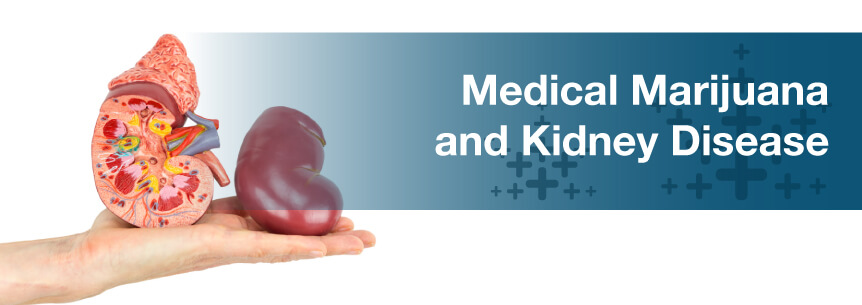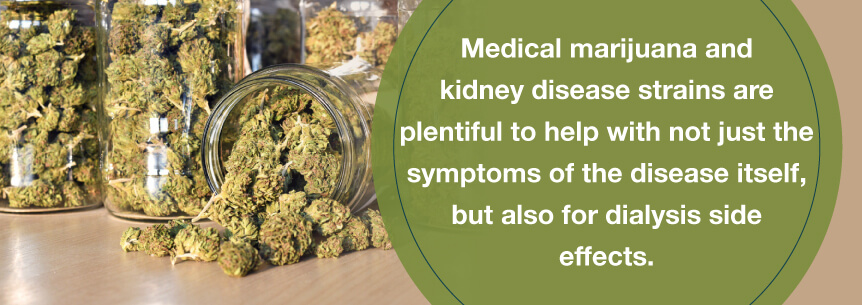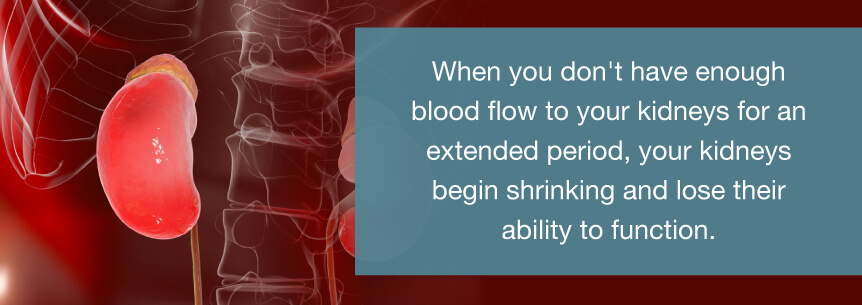
Most everyone is born with two kidneys that reside above your waist on both sides of your spine. Kidneys are responsible for cleaning your blood, filtering out the excess fluids and controlling your blood pressure. Kidney disease can lead to a whole range of unpleasant symptoms, and if not treated, it may be life-threatening. Treatment for kidney disease comes with a range of negative side effects itself. Medical marijuana and kidney disease treatment can help alleviate some, if not most, of these side effects.
If you’ve been considering medical marijuana for kidney disease, but are questioning if it can have an adverse effect on kidney function, you’ll be happy to know there is no link between the two, according to a study published in the American Journal of Medicine.
Chronic pain is not only common, but is also a debilitating symptom for many patients who suffer from chronic kidney disease. Opioids can help manage the pain, but they do come with the risk of adverse effects and can make your kidney disease symptoms worse. They can also negatively impact your quality of life, both physically and emotionally.
Many patients consider marijuana and kidney disease treatment due to its encouraging results in treating not just pain in a whole range of health conditions, but also in treating the problematic symptoms of kidney disease, such as:
Cannabis has pharmacologically active compounds that activate CB1 and CB2 receptors throughout your body, including your kidneys. Studies show using pharmacologic agents or their natural ligands to stimulate these receptors can have beneficial effects on your kidneys. However, outcomes depend on the type of renal insult, receptor distribution or the activation timing during chronic or acute kidney injury.
Find A Doctor Find A Dispensary
Medical cannabis for kidney disease can help alleviate symptoms such as:
Also, many patients with kidney disease require dialysis. Dialysis helps patients suffering from kidney failure by mimicking the organ’s capability of filtering blood. The procedure is necessary when you are experiencing complications because of kidney failure or when you’re at a critical level of kidney functioning. Dialysis may prolong some patients’ lives and/or provide physicians more time to find a suitable kidney donor.
However, dialysis does come with side effects. Medical marijuana can help combat the side effects of dialysis and improve your quality of life. Common dialysis side effects weed can help with include the following.
Medical marijuana and kidney disease strains are plentiful to help with not just the symptoms of the disease itself, listed above, but also for dialysis side effects. Let’s take a look at some good strains to help ease your symptoms of kidney disease and dialysis treatment.

Strains to treat kidney disease symptoms include the following.
Medical weed strains to try for dialysis include:
You can consume cannabis and kidney disease treatment strains in more ways than smoking it. You can eat or inhale the herb, as well as apply it under your tongue or rub it into your skin with a topical cream. Some methods are more effective and safer than others. Therefore, when deciding on the best method for you, you’ll want to consider your options carefully. Some methods of delivery include:
If you’re suffering from kidney disease, you could be a good candidate for medical weed. To obtain more information, spend some time reviewing our comprehensive website here at Marijuana Doctors. You can also find a qualified medical marijuana doctor and book an appointment. We also have a list of dispensaries you can browse through to find your perfect cannabis strains and products.
Find A Doctor Find A Dispensary
You have a million nephrons in each one of your kidneys. These tiny structures filter your blood and remove excess water and wastes that become urine. Kidney disease usually attacks these nephrons, damaging your kidneys and leaving them unable to eliminate these wastes, which then begin building up in your body. When this happens, it causes:
If you don’t receive treatment, this damage can worsen and eventually your kidneys could stop working — which is life-threatening.
When your kidneys are healthy, their job is to:
Numerous things can cause kidney disease, including injuries, genetic problems or medications. Your risk of kidney disease is higher if you have high blood pressure, diabetes or you have a family member with kidney disease. Other kidney issues include:
To check for kidney disease, your doctor will ask for urine and blood tests. You’ll require either a kidney transplant or dialysis if your kidneys fail.
Below are five types of kidney failure:
A trauma directly to your kidneys, such as an accident or physical impact, can cause this type of kidney failure. Other causes may be ischemia, where your kidneys aren’t getting enough oxygen, or toxin overload. Some things possibly causing ischemia include:
When you don’t have enough blood flow to your kidneys for an extended period, your kidneys begin shrinking and lose their ability to function.

When you don’t have sufficient blood flow to your kidneys, it may cause this type of kidney failure. With a lack of blood flow, your kidneys can’t filter toxins from your blood. If your doctor can find out what’s causing the lack of blood flow, they can usually treat and cure acute prerenal kidney failure.
You have a long-term urinary tract blockage preventing you from urinating, which then causes pressure and damages your kidneys eventually.
This condition occurs when your kidneys experience long-term damage because of intrinsic kidney disease. Direct trauma to your kidneys involving a lack of oxygen or severe bleeding causes intrinsic kidney disease.
In 1960, a lot changed with a revolutionary medical advancement regarding kidney disease. The invention of the Teflon shunt made it possible for doctors to access patients’ blood repeatedly. Because of this, dialysis could treat kidney failure. Doctors also successfully completed a kidney transplant from sibling donors. Kidney failure went from being a fatal disease to a chronic one. After this milestone, the main mission of the National Kidney Foundation (NKF) became research, advocacy and patient education about kidney failure.
During the 1970s and 1980s, NKF established other essential roles in raising public awareness and placing more emphasis on promoting and encouraging organ donation. Today, NKF is participating in research to help further improve the knowledge about kidney disease, better treatment and better prognosis.
The majority of individuals don’t experience severe symptoms until the advanced stages of their kidney disease. However, you might have:
Kidney disease symptoms are usually nonspecific, which means other illnesses can be causing them. Since your kidneys can compensate for lost function and are highly adaptable, symptoms might not occur until there’s irreversible damage.
Chronic kidney disease keeps your kidneys from doing their job effectively and involves conditions that could cause kidney damage. If the disease worsens, you can end up with high levels of waste buildup in your blood, making you feel ill. You can develop complications such as:
Your risk of blood vessel and heart disease increases too with kidney disease.
These complications can occur gradually over time. Early diagnosis and treatment can usually keep kidney disease from becoming worse. If your kidney disease continues to progress, it can eventually result in kidney failure, where you’ll need either a kidney transplant or dialysis to stay alive.
Patients with any chronic disease often suffer from anxiety, depression and sleep disruptions. When these conditions go untreated, they can lead to serious adverse consequences on the health of the patients. Early mental health assessment in chronic kidney disease can help identify if you’re at high risk of these mental conditions so you can receive adequate treatment to live a healthy, active life.

One study found the prevalence of these conditions among chronic kidney disease patients to be 86.5 percent insomnia, 69 percent depression and 71 percent anxiety.
Facts about the disease, according to the American Kidney Fund, include:
There is treatment for some types of kidney diseases, depending on what the underlying cause is. Unfortunately, more often than not, there is no cure.
The goal of treatment is typically controlling symptoms, reducing complications and slowing the disease’s progression. You will require treatment for end-stage kidney disease if there’s severe damage to your kidneys.
Your physician will give you treatment intended to slow or control what’s causing your disease. Your treatment will depend on the cause. And, even if the doctor can control the underlying condition, damage to your kidneys can continue to worsen.
Possible treatments to control complications and make you more comfortable include medicines for:
Your doctor may also suggest a lower-protein diet to reduce your blood’s waste products. They may also want to perform follow-up testing regularly to determine if your kidney disease is progressing or remains stable.
If your kidneys can no longer eliminate waste and water by themselves and you develop kidney failure, you’ll receive treatment for end-stage kidney disease — either a kidney transplant or dialysis.
During a kidney transplant, the surgeon surgically places a donor’s healthy kidney into your body. To keep your body from rejecting this new kidney, you’ll have to take certain medicines for the rest of your life. Dialysis patients aren’t required to have a kidney transplant.
Dialysis eliminates extra waste and water artificially from your blood when your kidneys can’t do it on their own. A machine filters excess fluids and waste from your blood in hemodialysis. If you receive peritoneal dialysis, the doctor inserts a catheter into the abdomen. The catheter then delivers a dialysis solution, filling your abdominal cavity to absorb the excess fluids and waste.

Conservative measures are another option if you don’t want a kidney transplant or dialysis, but you would probably only have a few months’ life expectancy once you reach the stage of complete kidney failure.
Your doctor may refer you to a dietitian to evaluate your present diet and suggest a special diet easier on your kidneys as part of your overall treatment plan. The dietitian may recommend consuming foods lower in potassium, avoiding products with added salt and limiting protein consumption. Any diet recommendation the dietitian gives you will depend on how your kidneys are functioning presently and your overall health.


Please allow us to access your location to find local dispensaries.
VIEW ALL DISPENSARIES ➔